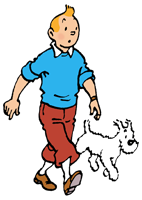|
Home
|
Apr 28, 2014
This week's themeHomonyms This week's words quiff gird mew feral bole 
Tintin, with his trademark quiff
Art: Hergé
A.Word.A.Day
with Anu GargHaving a character meet his double is a plot device in fiction, but we have such doppelgangers in language as well. We call such words homonyms. A homonym is a word that has the same spelling and pronunciation as another word, but a different meaning. A great example of a homonym is the word sound, which is really four different words under the same spelling and pronunciation:
This week we'll feature five words, each of which has homonyms. quiff
PRONUNCIATION:
MEANING:
noun: 1. A tuft of hair brushed up above the forehead. 2. A woman considered as promiscuous. ETYMOLOGY:
For 1: Origin uncertain, perhaps from coif. Earliest documented use: 1890. For 2: Origin unknown. Earliest documented use: 1923. USAGE:
"Posters of the intrepid boy reporter with the quiff and funny pants plastered the city." Claire Rosemberg; Spielberg 'Brings Tintin Home' Hollywood-Style; Agence France Presse (Paris); Oct 22, 2011. "A certain party got the quiff pregnant." William Deverell; The Dance of Shiva; ECW Press; 2004. See more usage examples of quiff in Vocabulary.com's dictionary. A THOUGHT FOR TODAY:
There is a rumor going around that I have found God. I think this is unlikely because I have enough difficulty finding my keys, and there is empirical evidence that they exist. -Terry Pratchett, novelist (b. 1948)
|
|
Subscriber Services
Awards | Stats | Links | Privacy Policy
Contribute | Advertise
Awards | Stats | Links | Privacy Policy
Contribute | Advertise
© 1994-2025 Wordsmith